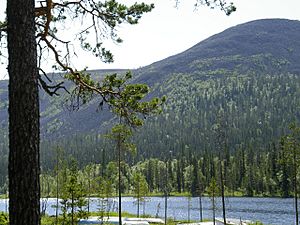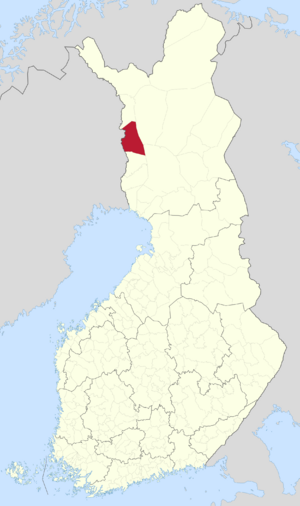Kolari facts for kids
Quick facts for kids
Kolari
|
||
|---|---|---|
|
Municipality
|
||
| Kolarin kunta Kolari kommun |
||

Lake Kesänki at Ylläs
|
||
|
||

Location of Kolari in Finland
|
||
| Country | ||
| Region | Lapland | |
| Sub-region | Fell Lapland | |
| Charter | 1867 | |
| Area
(2018-01-01)
|
||
| • Total | 2,617.87 km2 (1,010.77 sq mi) | |
| • Land | 2,559.29 km2 (988.15 sq mi) | |
| • Water | 59.15 km2 (22.84 sq mi) | |
| Area rank | 21st largest in Finland | |
| Population
(2023-12-31)
|
||
| • Total | 4,011 | |
| • Rank | 194th largest in Finland | |
| • Density | 1.57/km2 (4.1/sq mi) | |
| Population by native language | ||
| • Finnish | 96.9% (official) | |
| • Swedish | 0.6% | |
| • Sami | 0.1% | |
| • Others | 2.3% | |
| Population by age | ||
| • 0 to 14 | 15.2% | |
| • 15 to 64 | 57.6% | |
| • 65 or older | 27.1% | |
| Time zone | UTC+02:00 (EET) | |
| • Summer (DST) | UTC+03:00 (EEST) | |
| Website | www.kolari.fi | |
Kolari is a special area in Finland, right on the border with Sweden. This border follows the Torne River, which is the longest river in Europe that flows freely without dams.
Kolari is located in the Lapland region of Finland. It's home to about 4,011 people (as of 31 December 2023). The area covers about 2,617.87 square kilometres (1,010.77 sq mi), with a small part of it being water. This means there are about 1.57 inhabitants per square kilometre (4.1/sq mi) people living in each square kilometer.
Kolari shares its borders with other Finnish towns like Muonio, Pello, Kittilä, and Rovaniemi. It also borders Pajala Municipality in Sweden. In Kolari, almost everyone speaks Finnish.
Kolari is also home to the Kolari railway station, which is the most northern train station in all of Finland!
Contents
Fun in Kolari
Kolari is a great place for outdoor adventures.
Ylläs Ski Resort
One of the most popular places here is Ylläs. It's a famous ski resort where you can enjoy skiing and snowboarding in the winter. Many people visit Ylläs for its beautiful slopes and snowy landscapes.
Amazing Nature
The area around Kolari also has Finland's largest bog. A bog is a type of wetland, and this one is special because it has a forest that is thousands of years old. It's a unique place to explore nature and see ancient trees.
Kolari's Past
Kolari has a long and interesting history.
First People Arrive
The very first person to settle permanently in this area was a man named Pekka Kolari. He came from a region called Savonia in the early 1580s. His family name, Kolari, actually comes from an island called Kolarinsaari. This island is located near the village of Istunmäki.
Growing with Ironworks
In the 1600s, Kolari started to grow more. This was because of the Kengis (Köngäs) ironworks, which opened in 1644. Ironworks are places where iron is made. Many skilled blacksmiths lived in Kolari. They produced things like charcoal, tar, and chalk, which were then sent to Tornio.
Becoming Its Own Place
In 1809, Finland became part of Russia. Because of this, Kolari was moved to the Turtola parish, which is now called Pello. The winter markets, which used to be held in Kengis, had to move to Kolarinsaari island on the Tornio river because of the new border. Kolari became a chapel community in 1856. This meant it had its own chapel but was still part of a larger church area. Later, in 1894, Kolari became its own separate parish, which is like its own independent church community.
See also
 In Spanish: Kolari (Finlandia) para niños
In Spanish: Kolari (Finlandia) para niños
 | Janet Taylor Pickett |
 | Synthia Saint James |
 | Howardena Pindell |
 | Faith Ringgold |


